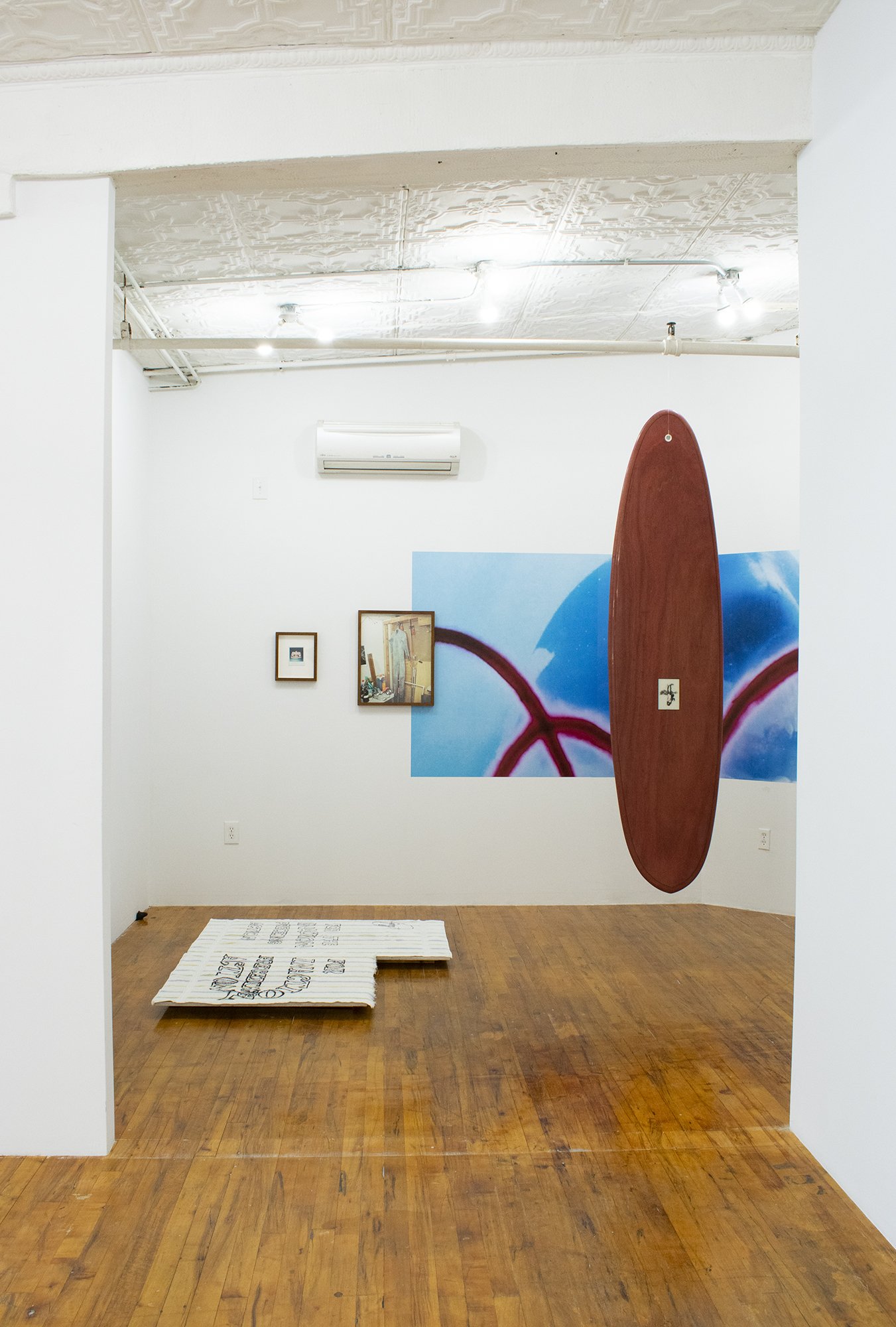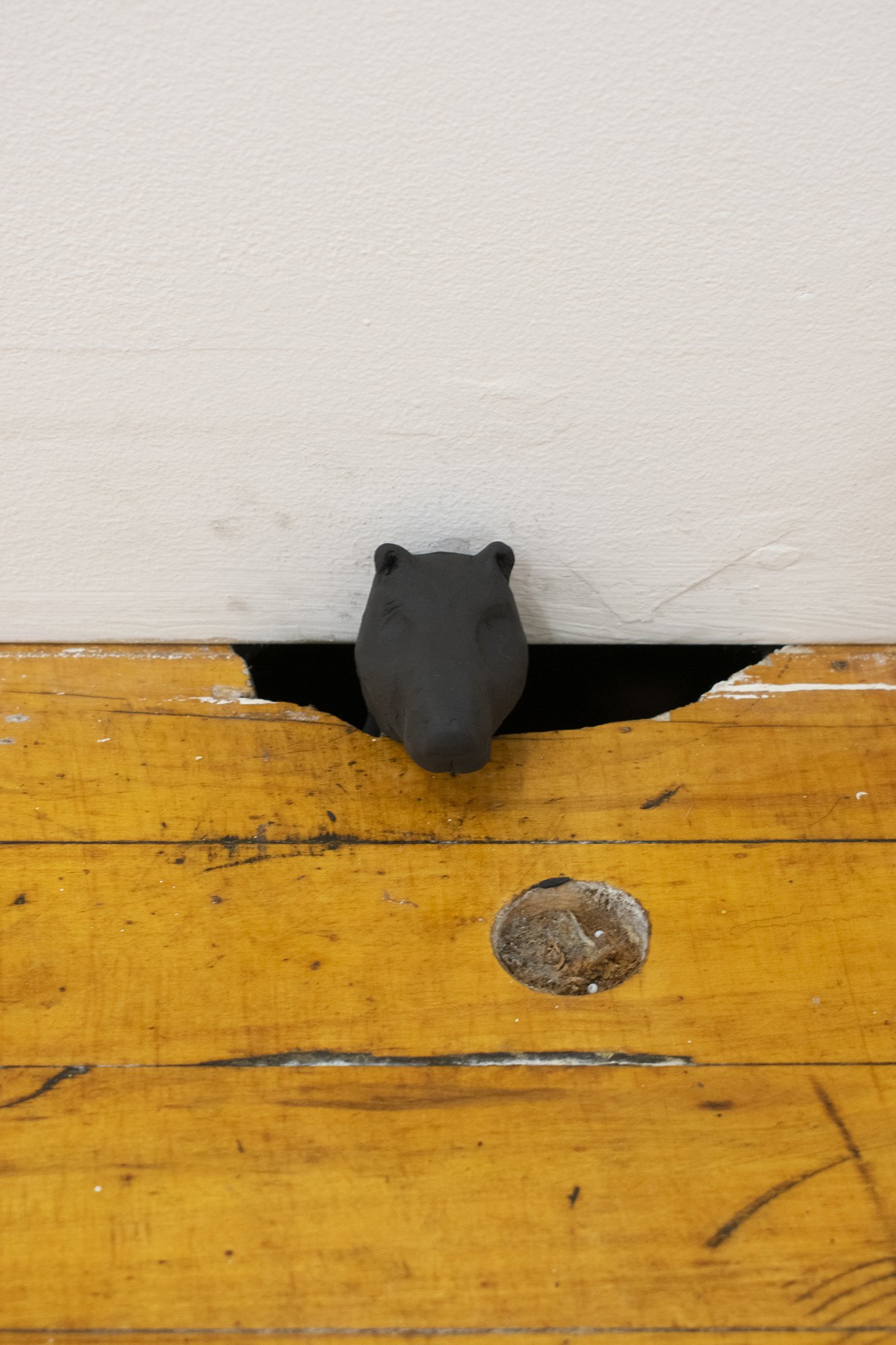Project Room
PICNIC ISLAND
Gregory Ruppe in collaboration with Reagan Kendall and Dan Schmahl
July 28—September 9, 2023
Opening Reception: Friday, July 28, 6—8 pm
Dreaming of islands—whether with joy or in fear, it doesn’t matter—is dreaming of pulling away, of being already separate, far from any continent, of being lost and alone—or it is dreaming of starting from scratch, recreating, beginning anew. Some islands drift away from the continent, but the island is also that toward which one drifts; other islands originate in the ocean, but the island is also the origin, radical and absolute
—Gilles Deleuze
In his book Beer and Revolution: The German Anarchist Movement in New York City, 1880—1914, historian Tom Goyens describes picnic culture as the “joyous network of dances, picnics, socials, clubs, and other celebratory opportunities[1]” held by immigrant anarchists, and attributes its development to New York’s radical geography, “shut off from American life, resembling an island cut out in between two oceans by a frigid body of water[2]”.
Galveston Island; a shifting sandbar, home to the United States’ deadliest natural disaster, the storm of 1900, and currently the planet’s fastest-rising sea levels, sensibly speaking shouldn’t be inhabited. But storm after storm the island continues to attract and in subtle ways breed its own divergent radicalism; both historically succinct with a Texan-libertarian spirit and something very uniquely the island’s own.
It’s just after ten at night and I’ve come home from the seawall with the dogs. My partner, Hiroe, hasn’t yet returned because she found a small crab along the sidewalk on our way and insisted on taking it back to the water. We opened the Picnic Surf Shapes shop about a month ago here on the island, on June the third to be exact. In addition to the boards I make, the shop offers a small selection of Picnic gear like hats, shirts, and stickers, fins by True Ames, board bags and fin wallets from Faro, and a small selection of other objects like ceramics, woodwork, hand-drawn garments and photography made by artist friends. It’s a modest-sized shop located in the corner of a Victorian-era building in the old red-light district of Galveston. We also distribute free zines in the shop, the first being a selection from John P. Clark’s The Impossible Community: Realizing Communitarian Anarchism made by my friend and collaborator Dan Schmahl. We recently hosted two nights of Cumbia, including a film screening, tape release, and Dj sets from artists Hamvre (Mexico City) and NoSocial (GDL/Dallas).
These types of activities have come to fall under the moniker Picnic Curatorial Projects, the brand’s curatorial arm. We want to make the Picnic shop a place of community and cultural experience, combining the best parts we know of surf and art, and maintain something that stays both true to a vision and eventually…economically viable. It is a challenge to develop a project with real conceptual rigor, checks and balances, and ecological kindness while keeping the company’s head above the water line, particularly within whatever late-stage form of capitalism we are currently in. I wonder if Clark would define our attempt as a Possible Impossibility or an Impossible one… People like Yvon Chouinard have come close to realizing something similar, but isn’t any act of making a form of destruction in the end?
I put myself through school working for a home builder in Houston, where I primarily learned custom cabinetry and trim. When I shaped my first board I went to wood because; A) wood is what I know well and; B) I wasn’t sure if the board would work and didn’t want to send foam straight to landfill. Whether there was more going on subconsciously at the time or not, I quickly discovered the nuances of shaping with wood to be in tune with personal philosophies and interests; from the kinds of shapes that wood demands to its material implications. Wood drastically lengthens a board’s lifespan, and slows cycles of production and consumption. Attitudes and surfing styles soften; replacing wave counts with a “riding for that feeling” sentiment. Radicality comes through forms of regression with nods to the past and a focus on quality over quantity.
Names like Greenough and Simmons are not synonymous with the culture here on the third coast. Strong nineties vibes linger in the surf shops and board choices that speckle our waters. But I believe that beyond offering a different aesthetic flavor, takes on shapes of the 1960s and 70s can work well in our surf and with the don’t take yourself too seriously — innermost limits of pure fun attitudes we have out here on the Gulf. The waves are generally not great, but it can turn on, and folks share the stoke when it does.
Returning to the small crab that Hiroe carried back to the shore, I am reminded of something I read in a book on Japanese block printing. During the Edo period, street vendors would capture small turtles and sell them for release again so that the purchaser might increase their karma. I somehow find this relatable, although I haven’t yet determined which side of the exchange I am on. In either case, this is what we try to do as humans I guess, the best we can.
[Text from PICNIC Issue No.2: I’d Rather Be On A Picnic by Gregory Ruppe]
Gregory Ruppe (b. Houston) is an artist, musician, curator, and shaper currently living and working in Galveston and Dallas, TX. He co-founded the artist collective Homecoming! Committee, and collaborative projects CULTURE HOLE, SWIM CLUB 수영 클럽, and Picnic Surf Shapes. Since 2013, he has been the Director of Exhibitions at The Power Station in Dallas, TX. Selected exhibitions and performances include Ulterior Gallery, New York, NY; Apples, Brooklyn, NY; Réunion Gallery, Zürich, Switzerland; Riverside—Space, Bern, Switzerland; the Hiroshima Art Center in Japan; The Berlin Becher Triennial, Germany; The Glasgow International at The Modern Institute, UK; Vilma Gold Gallery, London, UK; and The Calder Museum at Hepwoth-Wakerfield, UK; Dallas Museum of Art; The Nasher Sculpture Center, Dallas, TX; and Le Sud Bébé, Marseille, France.
Reagan Kendall is an artist living and working in Dallas, TX. Her work primarily utilizes hand-drawn typography and illustration to explore the human hand’s strive for perfection and the organic beauty that arises in our inability to reach it. Over the years her compositions have increasingly made use of textiles and garments as substrates. Influenced by a love for DADA, punk, and the celebration of imperfection, her early works manifested as meticulous freehand renderings of anarcho-punk album covers, one-to-one documentation of their content painstakingly transcribed in fine line sharpie with precision and care. The results harken back to a pre-digital age, carrying a similar kind of slowed handling and attention as the time spent with the very LP packaging they reference.
Dan Schmahl (b. Key West, FL) is an artist and printmaker based out of Galveston, TX. His work uses photography to seek and create visions of utopia in day-to-day life. Punk house science fiction under clamp light; just within reach. He has a BFA from Florida State University and was an artist-in-residence at the Galveston Artist Residency from 2014-2015. He’s exhibited work at the Galveston Arts Center, the Contemporary Arts Museum Houston, GAR Gallery, among others. He also runs a small artist-oriented risograph press called SUPER HIT PRESS in his spare time, in addition to Rising Tide Projects in downtown Galveston which he created with his partner Jessica Ninci in 2019.
A surf brand, a research lab, and a platform for experimentation and collaboration, PICNIC SURF SHAPES is an artist-led, conceptually rigorous, and ecologically dedicated initiative that produces hand-shaped surfboards, and other unique objects for use both in and out of the water. PICNIC was founded in early 2020 by artist and shaper Gregory Ruppe and Alden Pinnell of The Power Station contemporary art space in Dallas, Texas. Every shape is hand built from start to finish and is one of a kind. Every design is made in-house and in small batches with durability, and environmental kindness in mind. PICNIC CURATORIAL PROJECTS acts as the brand’s curatorial arm.








